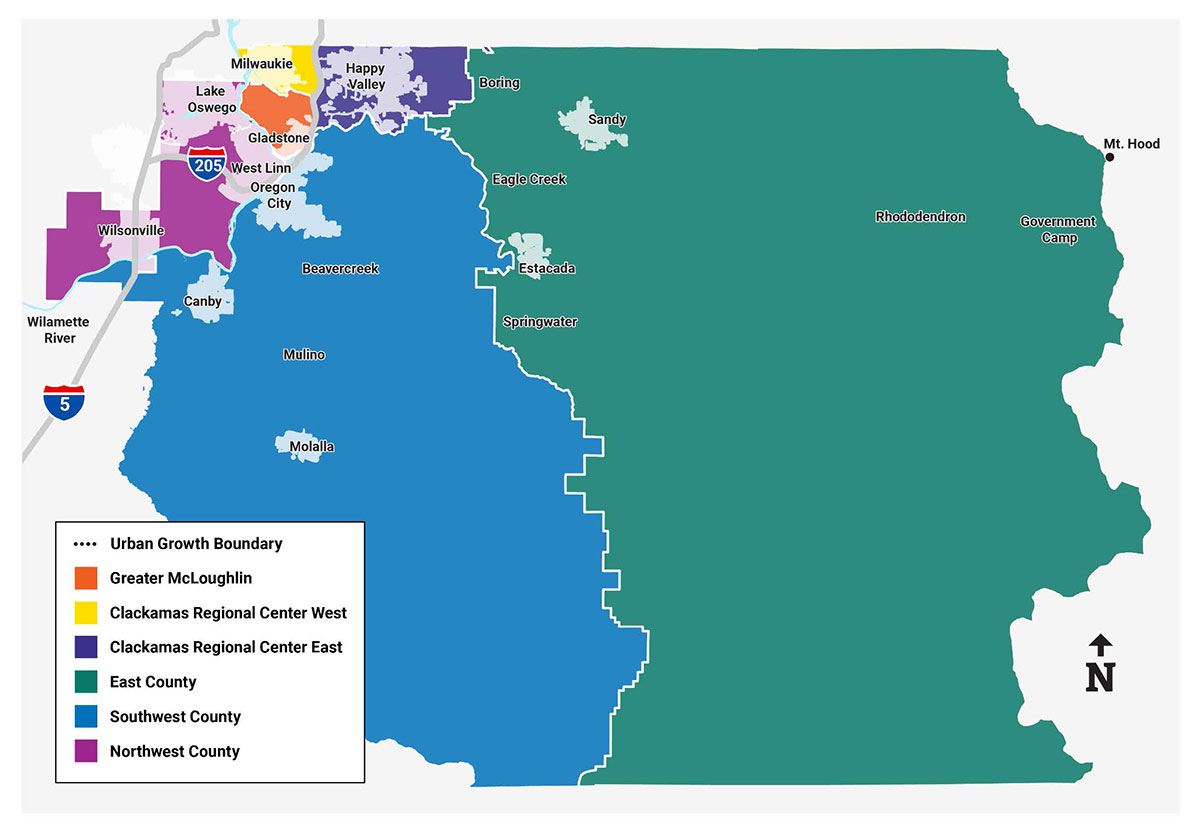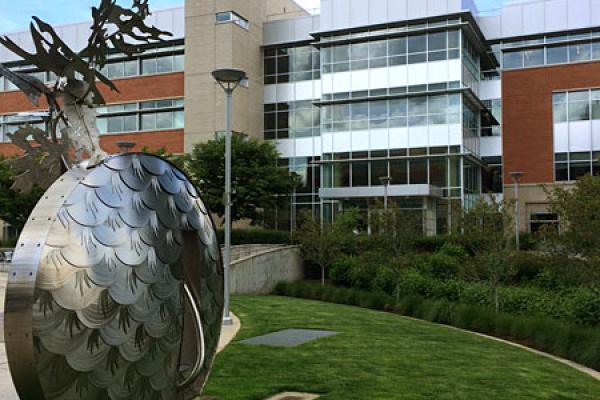Looking ahead to 2045
We are updating the Transportation System Plan (TSP) for unincorporated Clackamas County, and we need your help!
About every ten years, we review the progress we've made improving our transportation system and update our plan for the future. We will use updated data on how people and goods move through our county and where people live and work now and in the future, as well as ask community members about the types of transportation improvements they would like to see.
This information helps us as we consider the transportation changes that might be possible by 2045.
What is a Transportation System Plan and why is it important?
Within Clackamas County, we have:

The TSP is a plan for our transportation system (all of the roads, intersections, bike lanes, sidewalks, and more) that looks 20 years into the future. It is made up of policies, programs, studies and projects that meet transportation needs for residents, businesses and visitors throughout Clackamas County. It's for all community members and all the ways we travel.
What has changed since the last TSP update in 2013?
The last countywide TSP was adopted in 2013. Since then, a lot has changed.
Population Changes
The county has seen a lot of growth—our population grew by approximately 13.6% from 2006-2010 to 2018-2022. Some areas grew at faster rates. We expect more growth in the next 20 years, but at a slower rate. ˜
Many Clackamas County communities have different transportation needs than they did in 2013, and demographic changes may have played a role. Our county is more diverse than it was a decade ago. Nearly a fifth of our population is under 18 years old. Unincorporated Clackamas County has a growing population of people over 65 years old. Making sure we can reach a variety of people – from urban to rural areas –to better understand transportation needs will be important as we update our plan.
New transportation infrastructure
Since 2013, several identified policies and over 140 projects have been implemented throughout the County. Projects include the Clackamas County Connects shuttles, Molalla River Bridge replacement, 82nd Drive/Jennifer Street signal replacement, Bilquist Elementary School sidewalks, and more. In addition, the County has established local transportation funding through the Community Road Fund.
New traffic data
With new projects and growth, travel patterns change and, of course, the number of travelers moving around the county increases. The new data helps us plan toward 2045.
New plans
We've also been hard at work on new plans that will be included in the TSP, such as: the Sunrise Corridor and Gateway Refinement Plan, Walk Bike Clackamas, and the Transit Development Plan and Transportation Safety Action Plan, which are also both being updated.
New rules
In 2022, new state transportation planning policies went into effect through the Transportation Planning Rule. These policies impact what types of projects and goals are legally required for new transportation projects. These factors all play a role in the need for an updated TSP.
Vision and Goals
Our community's vision and goals will also need to be reviewed and updated, as needed. Our Public Advisory Committee will help us with this effort, and we'll seek broader community input on the vision and goals in early 2026
Who is involved in the 2045 TSP Update?
The TSP is influenced by people just like you! Beyond feedback from public events and surveys, there are several groups that will get into the details.
- All community members
We'll have opportunities for you to be engaged! - Project Management Team (PMT)
Guides the project and will make final recommendations to the County Planning Commission and Board of County Commissioners - Technical Advisory Committee (TAC)
Composed of agency staff from around the county and region to provide technical feedback on project deliverables. The TAC will advise the PMT. - Public Advisory Committee (PAC)
Composed of community members that represent a diversity of perspectives across the County. PAC members can help share their lived experience with moving around the county and help make sure we are engaging community members. The PAC will advise the PMT. Apply to be part of the PAC. - Geographic Subareas (GSAs)
There are six geographic subareas within the County. Each GSA will have online meetings and an in-person workshop that will be open to anyone interested in that area. Input collected at GSA meetings and workshops will inform the other committees and Project Management Team. - Project Partners
We will closely coordinate with ODOT, Metro, our cities and neighboring counties, and associated transit agencies. The focus for the TSP is the unincorporated areas within the county.
Geographic Subareas (GSAs)
Because Clackamas County is so large, we've broken the work into 6 different geographic subareas (GSAs); each area has unique and differing needs and communities.
- East County
Near Sandy and Estacada - Greater Clackamas County Regional Center/Industrial Area – East
Near City of Happy Valley - Greater Clackamas County Regional Center/Industrial Area – West
Near City of Milwaukie - Greater McLoughlin Area
Near Gladstone and Clackamas - Northwest County
Near Wilsonville, Lake Oswego, and West Linn - Southwest County
Near Molalla, Canby, and Oregon City

Importance of Public Involvement
Public Involvement is a key aspect in the TSP update. Hearing from community members about their transportation needs is essential in creating long-lasting, safe, and efficient transportation networks. Clackamas County is committed to working with a diversity of audiences throughout this update, including:
- Youth
- Community members and residents – urban and rural
- Active Transportation Users (ex: people who walk, bike, or roll)
- Community leaders
- Business interests
- Underserved populations – we'll make extra effort to engage with people who we don't always hear from, including BIPOC communities, people with lower incomes, seniors, Limited English speakers, and people with disabilities that make it more difficult to interact with our existing transportation infrastructure
- Elected officials
Framework for Engagement and Decision-Making with Underserved Populations
In early 2025, the Department of Transportation and Development partnered with the Public Health Division to create the Framework for Engagement and Decision Making with Underserved Populations. This document outlines specific steps that can be taken to strengthen community engagement activities, increase participation, and provide tips and considerations to support engagement and decision-making with underserved populations.
Meetings
Contact
Jeff Owen
Project Manager
TSPupdate@clackamas.us
971-429-0813
 Translate
Translate






